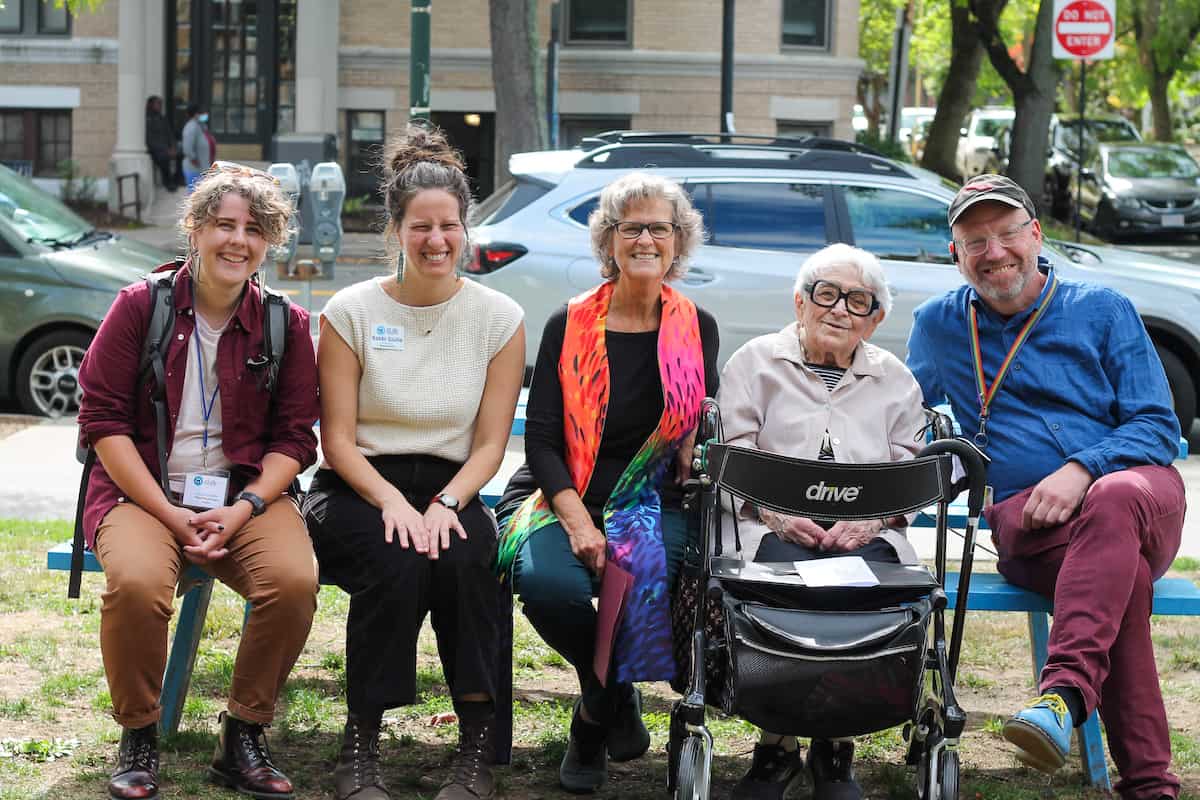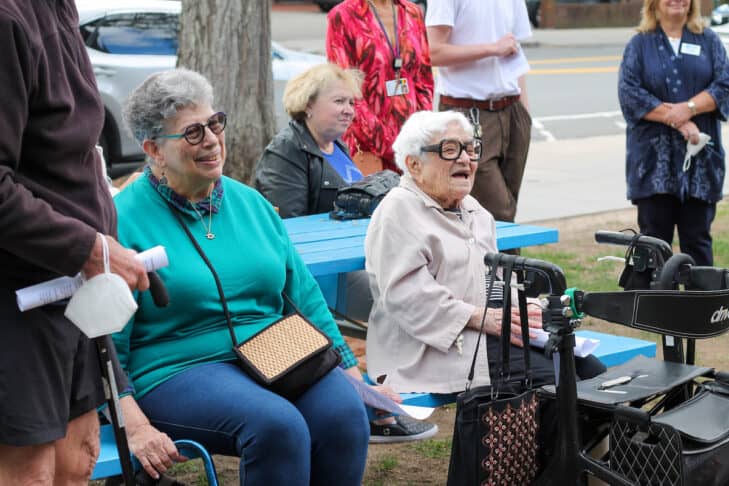As we age, our bodies change and mobility becomes even more central to our autonomy and independence. Why, then, do we so often see mobility devices—the tools that help us maintain our ability to get around—as a sign of aging and immobility?
In 2019, Anne Umansky, a resident of Hebrew SeniorLife’s Center Communities of Brookline (MA), had an idea to paint mobility devices in a different light, celebrating and honoring the tools that help seniors and those with disabilities get where they need to go.
She thought about how these devices supported older people in using their feet, which led to the idea of blessing the “fleet.” A blessing of the fleet ceremony is a centuries-old tradition in which local clergy would bless the boats in fishing villages, praying for a safe and bountiful season.
Anne brought her plan to one of us, Rabbi Jim Morgan of Hebrew SeniorLife, who was immediately supportive of the idea. Wanting the event to be interfaith, he reached out to Reverend Lisa Perry-Wood of First Parish Brookline (Unitarian-Universalist) as a partner. Rev. Lisa and Rabbi Jim celebrated the first blessing in June 2019, but subsequent gatherings were put on hold due to COVID-19 precautions.
Anne’s idea came back to life this year with “A Blessing of the F(l)eet!: An Interfaith Celebration of How We Move,” this time joined by the Rabbi Giulia Fleishman of the nonprofit 2Life Communities. As Anne said back in 2019, “I am so happy that this head can still come up with ideas that will blossom into reality!”
Alongside Rev. Perry-Wood, we celebrated and individually blessed all the mobility devices that allow people get to where they need to go – from wheelchairs to walkers to canes to feet. Over two dozen people—mostly residents of Hebrew SeniorLife’s Center Communities of Brookline and 2Life Communities’ Brown Family House—came together for the return of the blessing, which kicked off with our rendition of “These Boots Are Made for Walkin’” re-imagined as “These Wheels are Made for Rollin.”
It was a beautiful ceremony full of music, prayer, fellowship and community, and a special moment to see attendees smiling, celebrating and gathering around something that can too often be a sign of lost mobility or a daily burden in our contemporary, fast-moving society.

As religious interfaith leaders, we encourage those we serve to give thanks for all they have, especially when it’s most difficult to appreciate it. That means instead of focusing on our changing bodies and the fact that we may not be able to get around like we used to, we can think about all of the people who create safe paths of movement for us, including those who build and repair mobility devices, the police and others who help calm traffic (including for this event!) to keep us safe, and every day folks who are patient with us as we share the sidewalks and corridors of our world.
We were very intentional in making this blessing an interfaith event. By bringing together local spiritual leaders—Jewish and non-Jewish alike—we tried to celebrate accessibility in all its forms.
We have big plans for the future of the blessing—making it an annual occurrence, fleshing out the liturgy and expanding its audience beyond seniors. We hope the community will join us next year for an even larger gathering and continuing conversations about mobility and aging in community.
Mobility provides us the freedom of autonomy—from buying groceries to seeing old friends to grabbing a glass of water—and it’s something we take for granted all too often. This celebration provided a chance to change the way people see their mobility aids and appreciate what they do for us as our bodies change. By gathering the community around music, spirituality and celebration, we hope to change people’s relationships with the devices they so often dread as signs of aging. Walkers, canes and wheelchairs aren’t something to be feared, but celebrated for giving us the gifts of mobility and freedom.
Rabbi Jim Morgan is a rabbi and chaplain at Hebrew SeniorLife, providing spiritual care and services to the residents of three supportive senior housing facilities in Brookline, MA. In his role, he facilitates Jewish and interfaith learning opportunities, leads religious services, and provides spiritual support in times of struggle and celebration. He also serves as chaplain for two Russian-speaking units in the organization’s Long Term Chronic Care Hospital and patients of its Recuperative Services Unit. In addition, he is the rabbinic advisor for the Worship and Study Minyan at Harvard Hillel.
Rabbi Giulia Fleishman is the director of spiritual care at 2Life communities, where she leads interfaith spiritual care across 2Life’s six campuses and works to create a pluralistic spiritual life for residents and staff alike. Previously a 2Life rabbinical intern, Giulia now works to support everyone at 2Life in tapping into their own sense of meaning, purpose and belonging.
This post has been contributed by a third party. The opinions, facts and any media content are presented solely by the author, and JewishBoston assumes no responsibility for them. Want to add your voice to the conversation? Publish your own post here. MORE

